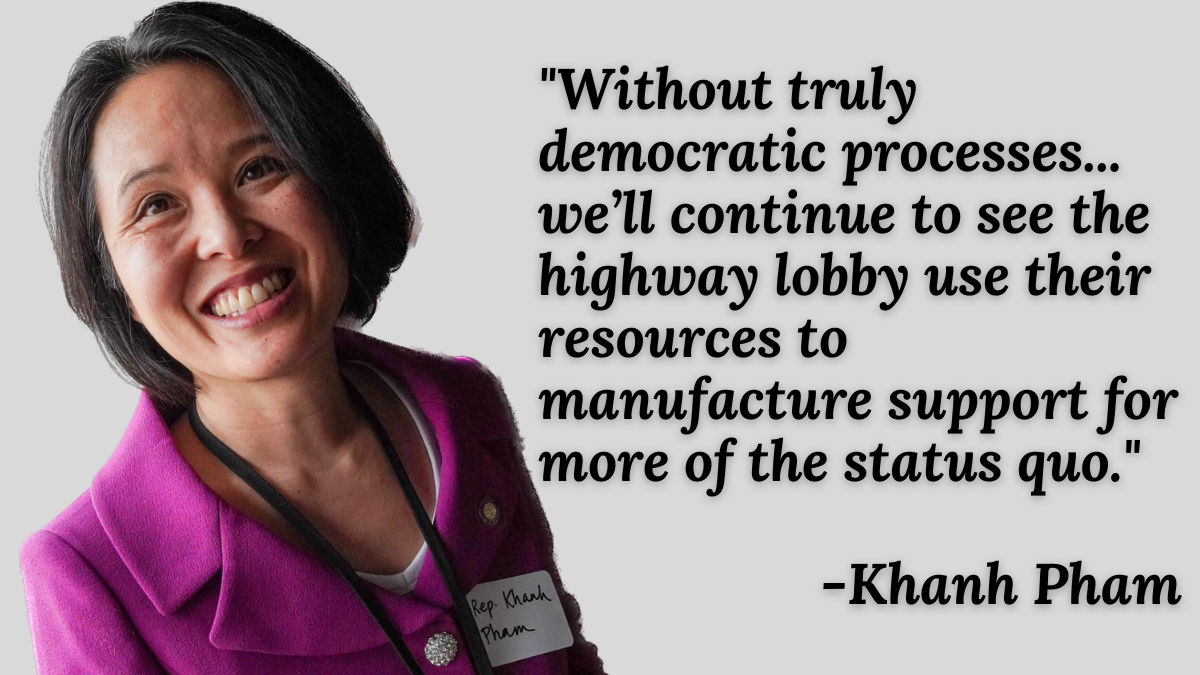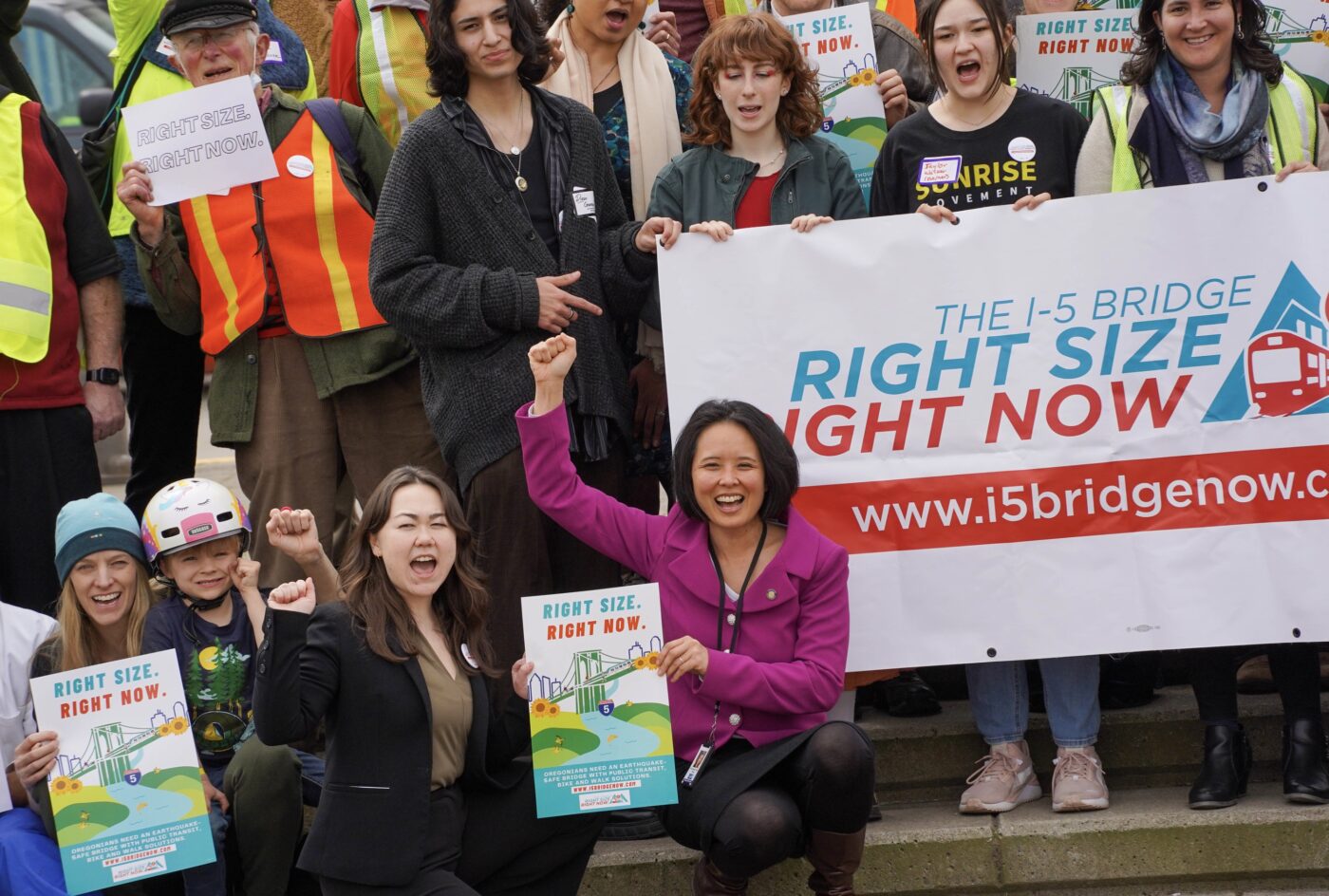This recap of the 2023 Oregon Legislative session is the opinion of Khanh Pham, a Portlander who serves as Oregon House Representative for outer southeast Portland (District 46).
This was my first full session as a sitting member of the Joint Committee on Transportation, and I continue to be moved by my constituents’ enthusiasm for tackling transportation reform. From the radical joy that accompanies citywide Pedalpalooza rides, the hopefulness expressed by last year’s Youth vs ODOT climate strikes, or the grief and fury we collectively share as traffic fatalities continue to mount — transportation advocates deeply care about our streets because we deeply care about each other and want to see a world in which everyone moves through our community safely, affordably, sustainably and joyfully.
As a legislator and transportation advocate I wanted to share with BikePortland’s readers (thanks Jonathan!) my reflections on the session as well as four key takeaways about where we go next.
I’m deeply hopeful about our collective potential to shape the future of Oregon’s transportation system. Our collective efforts to build power and awareness for the need for an overhaul of transportation policy are showing signs of success. Perhaps nothing embodies this success more than HB 3014, which provides greater flexibility for school districts to spend funding on programming for students to bike, walk and take transit to school. In many ways this bill’s passage represents the best of our community, our government and our democratic process. I’m so grateful for the leadership from Oregon Walks, Community Cycling Center, Coach Sam Balto, Representatives Hoa Nguyen and Courtney Neron and their staff, and for policymakers at Metro, MESD and Eugene 4J. I’m also grateful for the dozens of individuals and organizations who engaged with the Just Crossing Alliance – I’ll never forget the remarkable turnout on the JCA lobby day and the month of powerful testimony demanding a right sized bridge.
Similarly, the concern my colleagues and I heard from constituents about tolling ultimately helped spur Governor Kotek’s swift action to impose a tolling moratorium until 2026. While I believe congestion pricing should serve as a key tool in managing our transportation system, ODOT’s tolling proposal was an inequitable new taxing mechanism that significantly raised taxes on commuters only to direct the new revenue towards ODOT’s expensive freeway-building addiction. This moratorium simply wouldn’t have happened without community members and Clackamas County legislators, whose combined advocacy caught the Governor’s attention. I will continue to watchdog congestion pricing policy to ensure we don’t further prioritize funding freeway expansion over investments in congestion relief, safer streets, or climate action.
Last month, the Urban Mobility Office released the finance report requested by Governor Tina Kotek. For the first time in memory, ODOT fully admitted that the agency had no forseesable plan to pay for their multiple costly freeway expansions.
While this report is a cause for validation and celebration for advocates who have sounded the alarm on ODOT’s finances for years, the report’s overarching findings remain grim. ODOT’s own forecasts predict a precipitous drop in revenue in the years ahead as motorists switch to cars that use less (or no) gasoline, and this lack of funding coincides with an alarming need to invest in an aging system suffering from decades of disinvestment and inertia. I don’t have to tell you about the soaring traffic fatalities, the growing potholes, the lack of sidewalks, or the 700 bridges across the state in need of seismic retrofit – much of which could be addressed by redirecting the billions we’re spending on widening roads. The Highway Trust Fund is about to be bankrupt at exactly the moment the bill for maintenance and safety is due – and yet ODOT still intends to use the state credit card to spend billions on more freeway lanes.
Unfortunately, the legislature yawned at the chance to grapple with these structural problems this session. A bill I sponsored to increase funding for fixing dangerous state-owned highways was whittled down to a mere $1 million despite over $300 million in need, even after heart-wrenching testimony from elected officials and bereaved family members. Two bills to ask ODOT to study passenger rail service died before receiving floor votes. Bills to encourage ODOT to prioritize maintaining existing roads over building new ones and to add new voices to the Oregon Transportation Commission never received hearings. Legislation to subsidize electric bicycles and to extend the wildly popular electric car rebate program both died as well. The signature accomplishment of the Joint Committee on Transportation – allocating funding for the sorely needed replacement of the Interstate Bridge – avoided facing these dire fiscal circumstances by raiding the General Fund for revenue, siphoning money away from affordable housing and education and breaking the decades-long precedent that transportation projects must be paid by transportation revenue.
I share these anecdotes with trepidation. To be clear, I don’t believe these outcomes are reason for discouragement, nor do I wish to suggest my colleagues aren’t interested in addressing these looming problems. While this inaction is cause for alarm, I’m heartened by the growing consensus I’m hearing from legislators and Oregonians alike across the state that this status quo is untenable, and it’s time to prioritize addressing these problems for the health and well-being of both our communities and the economy.
Fortunately, an opportunity looms.
“We can meet the moment the climate emergency demands… by recognizing our uncertain future requires an unapologetic commitment to building a transportation system that rapidly phases out fossil fuels.”
The upcoming long legislative session marks a crucial opportunity in our larger movement for transportation justice and reform. All signs suggest that legislators will be prioritizing a generational investment in transportation in the 2025 legislative session. With the right leadership from both elected officials and community members, we have eighteen months until a legislative session that promises to face our problems head-on. The end of the gas tax is the end of an era, and it’s time we prepare for the future.
Oregon can invest in transportation that prioritizes public health in every community across the state with cleaner air and water, encouraging more walking and biking while dramatically reducing traffic fatalities. We can get congestion pricing right and ensure motorists are never again stuck in freeway traffic while minimizing the burden to low-income commuters and also maximizing the availability of healthier alternatives to driving. Oregon can prepare for a just transition in which every Oregonian receives rebates for buying both electric cars and electric bikes. We can dramatically increase transit service locally and regionally, running irresistibly frequent and reliable buses and trains across our region and the state. We can prioritize maintenance of existing roads over expansion of new ones, saving money while simultaneously preparing our community for future climate and seismic events. We can make good on our commitment to replace the existing Interstate Bridge with a new crossing that includes excellent transit and does so without overspending on unnecessary and devastatingly expensive freeway components. We can meet the moment the climate emergency demands and govern as though 40% of Oregon’s carbon emissions come from transportation, recognizing that our uncertain future requires an unapologetic commitment to building a transportation system that rapidly phases out fossil fuels. We can propose a Green New Deal by ensuring the construction of new bridges, bus lines and sidewalks provides economic opportunity, stability and investment for tens of thousands of Oregonians with family-wage jobs and Project Labor Agreements. These reforms stand to bring prosperity and health to every Oregonian across the state.
This isn’t hypothetical rhetoric – each of these ideas represent planks of a policy platform I’m eager to bring to community as we approach the 2025 legislative session. Designing and enacting this platform will require more of the type of policy and advocacy collaboration that powered Just Crossing Alliance and the Bike Bill – which, fortunately, we’ve already demonstrated is effective and well within our grasp.
For the seventh time in four years, Republican Senators chose to shut down our state government instead of showing up to vote. While I and my House colleagues passed hundreds of bills, legislation stacked up in the Senate, waiting for Republican Senators to return to work. This ultimately led to the death of numerous bills and to our office undertaking what would otherwise enjoy months of legislative review and budgetary consideration in just over a week. This is an ineffective, broken and antidemocratic way to govern. 46 states and the US Congress have a Simple Majority requirement; Oregon should align its rules with the rest of the country. I introduced legislation last month that would allow us to operate under Simple Majority rule. Without passing reforms we appear doomed to remain hostage to repeated shutdowns; with these changes, Oregon’s legislature could operate like Minnesota’s, which this spring passed what national advocates are calling the country’s best transportation package. We’re also seeing attempts to dilute democracy locally in Portland as well; I recently signed a letter opposing an initiative to weaken the charter proposal approved by 58% of voters last fall.
If you believe that the majority of Oregonians would like the state to pursue cost-effective solutions to tackling congestion, air pollution, climate change, and traffic safety — as I do — I need your help standing up for the democratic institutions and practices that empower constituents to express these views. Without truly democratic processes, community engagement is heavily manipulated by the entrenched and powerful, and we’ll continue to see the highway lobby use their resources to manufacture support for more of the status quo, at a time when it’s abundantly clear that’s an unacceptable outcome.
I’m feeling a mixture of hope, determination and gratitude for what we collectively can achieve for our community and for our state. I firmly believe we have the opportunity in the years ahead to remake and reinvest our streets in line with our values – it’s up to us to work together to seize it.
I’m under no illusion these are easy fixes, but I didn’t run for office to enact easy fixes, nor did my constituents elect me to shy away from fights to make our community healthier and safer. There is too much at stake to shy away from demanding our streets be a safer, healthier place to walk, bike, drive, or catch a bus. We have a narrow window to make these transformative changes, and with your help in the months ahead, we can chart a better future. In the meantime, I hope you and your community are staying cool during the hottest summer on planet Earth. I hope to see you at the Sunrise PDX celebration of No More Freeways’ Sixth Birthday or a future BikePortland Happy Hour!
BikePortland strives to present opinions from a wide range of perspectives. If you have something you’d like to share, please contact us.



